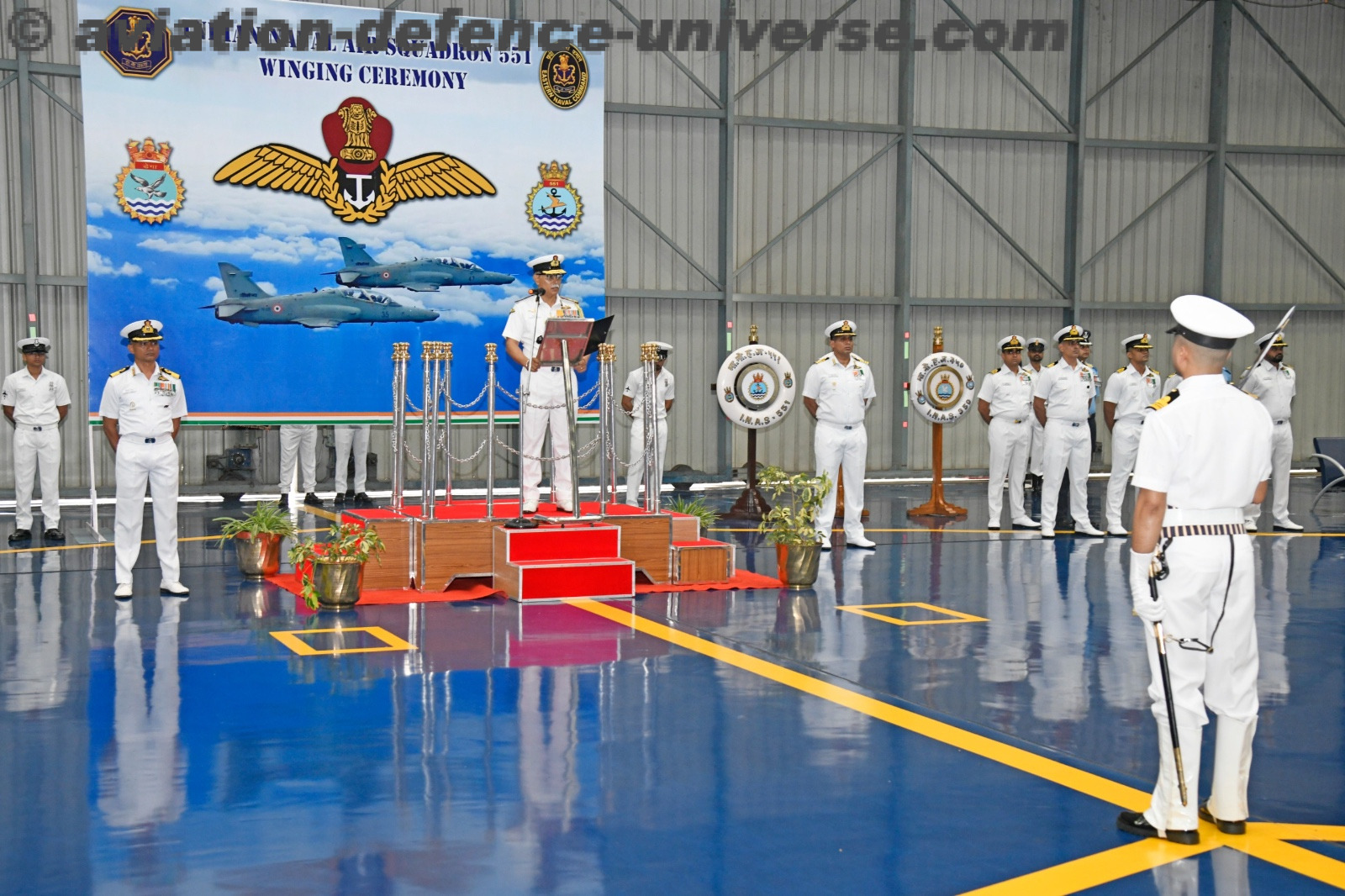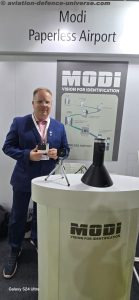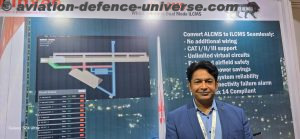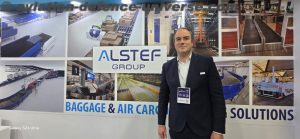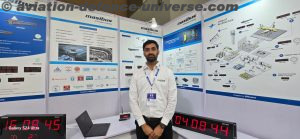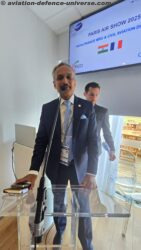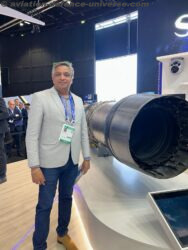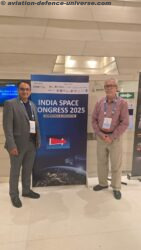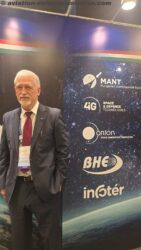- From Paper to Pixels
- Enhanced Passenger Experience
By Sangeeta Saxena
New Delhi. 04 December 2024. A surname which is the most known in India of today, caught a lot of attention at Indi Airport 2024. Not a proper noun this MODI is an acronym. Modular Digits (MODI), a Germany-based technology firm with nearly three decades of experience, unveiled its ambitious vision for transforming air travel through innovative, paperless airport solutions. Spearheaded by a dynamic leadership represented by two generation, Sven Klawunder the junior generation and CCO, put forth solutions to common airport challenges such as long passenger queues and enhanced security measures by leveraging advanced facial recognition technology. In an exclusive interview with Aviation and Defence Universe (ADU), he delved into the company’s mission to create seamless, efficient, and secure travel experiences for passengers worldwide.
ADU. So, we are meeting here at Indy Airport. What is your company MODI showcasing here?
Sven Klawunder. MODI is the abbreviation for Modular Digits, a company nearly 30 years old and based in Germany. Our vision is to create a paperless airport, addressing common issues like long passenger queues and enhancing the overall travel experience. We aim to make travel more seamless and safer through facial recognition technology, improving passenger flow, security, and overall experience.
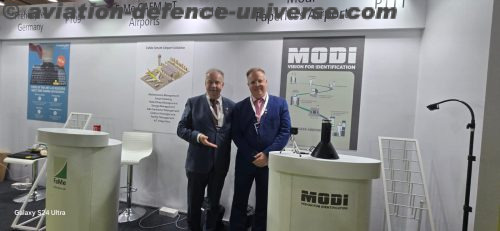 ADU. You mentioned that MODI is working towards a paperless airport. Can you explain what that entails?
ADU. You mentioned that MODI is working towards a paperless airport. Can you explain what that entails?
Sven Klawunder. Absolutely. A paperless airport means that all passenger information is digitized and accessible through facial recognition. Passengers can enroll their passports and boarding passes via an app or at the airport using special kiosks. Their facial data acts as a digital token, allowing them to navigate through various airport touchpoints—such as baggage drop-off, security checks, passport control, lounges, shopping, and boarding—without the need for physical documents.
ADU. How does MODI’s facial recognition technology improve the passenger experience?
Sven Klawunder. Our facial recognition system is designed to be highly efficient and user-friendly. It operates “on the move,” meaning passengers don’t have to wait in front of a camera. Instead, as they walk through the airport, cameras identify them seamlessly without requiring them to stop or turn their heads. This significantly reduces waiting times—our system can handle passport control in as little as three and a half seconds—thereby enhancing the overall efficiency and satisfaction of the passenger experience.
ADU. How does MODI plan to integrate with existing systems like India’s Digi Yatra?
Sven Klawunder. MODI sees tremendous potential in expanding beyond the current Digi Yatra system, which is primarily used for domestic flights. We are actively engaging with Indian authorities and stakeholders to integrate our paperless solutions for international travel as well. By collaborating with existing initiatives and enhancing them with our technology, we aim to create a more comprehensive and efficient travel experience for all passengers.
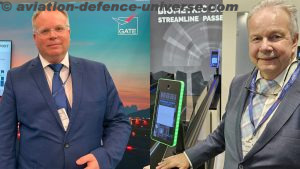 ADU. What has been MODI’s interaction with Indian aviation authorities so far?
ADU. What has been MODI’s interaction with Indian aviation authorities so far?
Sven Klawunder. We have had several productive meetings and discussions with Indian aviation authorities and major airport companies. For instance, we recently had a meeting in Ahmedabad with leading airport authorities to understand their needs and demonstrate our solutions. Additionally, through our partnership with the GATE community, comprising technology companies from Germany, we have been actively showcasing our capabilities and exploring opportunities for collaboration in India’s rapidly growing aviation market.
ADU. Is MODI’s paperless system being used in other parts of the world?
Sven Klawunder. Yes, our technology is already in use at several major airports around the world, including in the USA—such as Washington, Denver, and Las Vegas—and we are expanding into the Middle Eastern market, with projects underway in Riyadh. Our solutions are designed to be scalable and adaptable, making them suitable for airports of all sizes globally. We are also exploring opportunities in emerging markets like India, where the aviation sector is experiencing significant growth.
ADU. How does MODI address concerns about job displacement due to automation?
Sven Klawunder. MODI believes that automation should complement human roles rather than replace them. Our technology is designed to handle repetitive and time-consuming tasks, allowing airport staff to focus on more critical and customer-centric roles. For example, while our facial recognition system streamlines passport control, it enables border guards to concentrate on more nuanced aspects of security and decision-making, thereby enhancing overall operational efficiency without reducing employment opportunities.
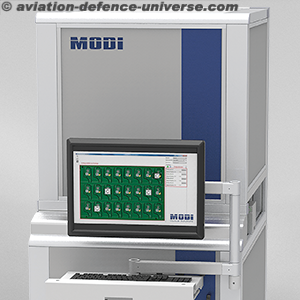 ADU. What are MODI’s plans for expanding its presence in India?
ADU. What are MODI’s plans for expanding its presence in India?
Sven Klawunder. We are optimistic about the future of aviation in India and are actively pursuing opportunities to implement our paperless airport solutions. We have ongoing discussions with major airport operators and are looking to establish test stations for our technology. Additionally, we are exploring integration opportunities with heliports, which are increasingly important in India’s expanding aviation landscape. Our goal is to support India’s vision of becoming a leading aviation market by providing innovative, efficient, and secure solutions.
ADU. How does MODI align its solutions with India’s “Aatmanirbhar Bharat” vision?
Sven Klawunder. MODI is committed to supporting India’s “Aatmanirbhar Bharat” initiative by fostering local partnerships and enhancing indigenous capabilities. Through our Boeing India Repair Development and Sustainment (BIRDS) Hub program, we collaborate with Indian MSMEs and technology partners to build a robust MRO ecosystem. This not only aligns with India’s self-reliance goals but also stimulates economic growth and innovation within the country’s aerospace and defence sectors.
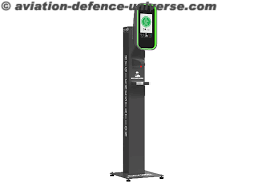 ADU. What future developments can we expect from MODI in the aviation sector?
ADU. What future developments can we expect from MODI in the aviation sector?
Sven Klawunder. We are continuously innovating and expanding our technological capabilities. Future developments include integrating advanced technologies like AI, machine learning, and autonomous systems to further enhance operational efficiency and passenger experience. We are also planning to expand our presence in key international markets and collaborate with more Indian airports to implement our seamless, paperless solutions, making air travel faster, safer, and more enjoyable for everyone.
 Modular Digits (MODI) is poised to transform the aviation industry with its pioneering vision of paperless airports, leveraging cutting-edge facial recognition technology to enhance passenger experiences and streamline airport operations. Through strategic collaborations with Indian aviation authorities and a commitment to supporting the “Aatmanirbhar Bharat” initiative, MODI is driving innovation and efficiency in one of the world’s fastest-growing aviation markets. As MODI continues to expand its global footprint, its seamless and secure solutions promise to redefine air travel, making it more accessible, efficient, and enjoyable for passengers worldwide. The future of aviation is indeed looking brighter and more connected, thanks to MODI’s relentless pursuit of excellence and innovation.
Modular Digits (MODI) is poised to transform the aviation industry with its pioneering vision of paperless airports, leveraging cutting-edge facial recognition technology to enhance passenger experiences and streamline airport operations. Through strategic collaborations with Indian aviation authorities and a commitment to supporting the “Aatmanirbhar Bharat” initiative, MODI is driving innovation and efficiency in one of the world’s fastest-growing aviation markets. As MODI continues to expand its global footprint, its seamless and secure solutions promise to redefine air travel, making it more accessible, efficient, and enjoyable for passengers worldwide. The future of aviation is indeed looking brighter and more connected, thanks to MODI’s relentless pursuit of excellence and innovation.
As told to Sangeeta Saxena































